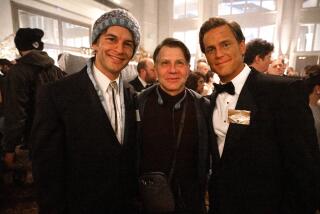BOOK REVIEW : Tale Details a Lonely Homosexual’s Sad Life : FAIRYLAND<i> by Sumner Locke Elliott</i> Harper & Row $17.95, 256 pages
- Share via
After reading this intensely sad novel, the reader can only fall back on counting his or her blessings: At least I’m not a gay person in Australia, living in a working-class neighborhood between the two great wars.
“Fairyland” is very much like E. M. Forster’s “Maurice.” It’s also like some of the very early Christopher Isherwood--except that he was sophisticated enough to at least make a careless attempt to cover his tracks. To change metaphors, “Fairyland” is as sad and painful as an open wound. There’s no bandage available, no treatment. The author only invites the reader to observe his festering sorrow--to engage, if only vicariously, in his pain.
Australia! Not a good place to be homosexual in those days, in an ignorant, brutal, undereducated, homophobic society. Seaton Daly is an only child, desperately lonely. His mother is unaffectionate and a hypocrite, preferring to believe that her husband died a hero’s death in World War I, when actually he perished in a beery barroom brawl. To Seaton, both his parents are relentlessly inaccessible: his father because of having become a “sacred image,” a fallen hero, and his mother because she simply isn’t fond of him.
Loneliness without end is what we have here. Very early on, there’s a nice girl who likes Seaton. She dies. Later, still in grade school, there are several boys with whom he has the usual physical adventures. But these boys are only sexually romping, waiting around until they become men. Seaton, still dreadfully young, yearns for a great love--or any love at all.
Ironically, somewhere in this narrative, the reader longs to give Seaton a good shake. The novel rapidly becomes a catalogue of men (and women) who just don’t work out. A nice gay guy who loves him isn’t cute enough. A woman who wants his body is portrayed as a gorgon in 4-inch heels. The man Seaton loves the most teases him mercilessly, then runs off with the one girl (outside of that long dead one) Seaton ever loves.
Other men who make advances are either smarmy or horrible or speak in accents of which Seaton disapproves. And when Seaton goes into the Army, a vile disgusting captain has his way with him.
But isn’t this kind of sorrowful love mix-up the kind of thing that every vulnerable person leaves him or herself open to in this cruel world, regardless of his or her sexual preference? It’s rarely that the person one loves uncomplicatedly loves one back. Otherwise we’d all subscribe to Bride magazine instead of reading Romeo and Juliet. (Being gay does lengthen the odds, but to be lonely is our human condition, unless someone is keeping the cosmic party of love a big secret from me.)
Fiction has its own imperatives. Forster’s Maurice gets his happy ending, because Forster himself insisted on it. Isherwood’s “A Single Man” has lost his beloved, but still fiercely embraces life and all the possibilities it might yet offer. But Sumner Locke Elliott’s Seaton Daly is doomed from the beginning. Society won’t give him half a chance, and that’s not giving away the plot, because his murder occurs on Page 2, with an avenging woman declaring: “There be no more of your harmful love, Seaton.”
I’m sure the author has not exaggerated the plight of his gay protagonist. And I’m sure there’s historical good in this book. But I’m glad it’s fiction, and I’m glad it’s over.
Next : “The Search for Eve” by Michael H. Brown (Harper and Row).
More to Read
Sign up for our Book Club newsletter
Get the latest news, events and more from the Los Angeles Times Book Club, and help us get L.A. reading and talking.
You may occasionally receive promotional content from the Los Angeles Times.










